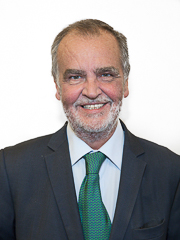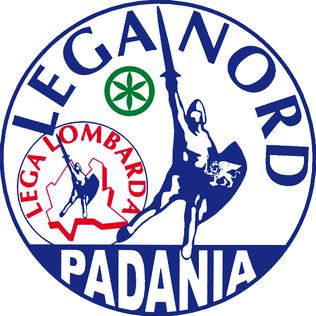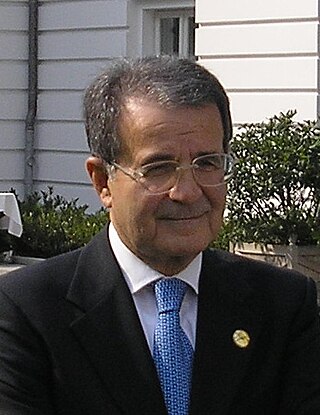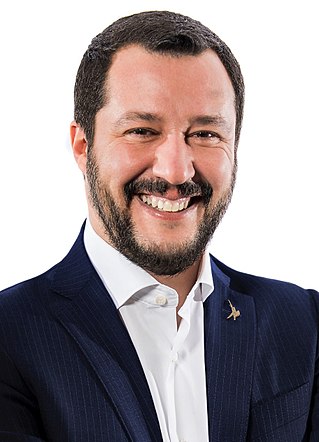
Lega Nord, whose complete name is Lega Nord per l'Indipendenza della Padania, is a right-wing, federalist, populist and conservative political party in Italy. In the run-up of the 2018 general election, the party was rebranded as Lega, without changing its official name. The party was nonetheless frequently referred to only as "Lega" even before the rebranding, and informally as the Carroccio. The party's latest elected leader was Matteo Salvini.

The Italian Socialist Party was a social democratic and democratic socialist political party in Italy, whose history stretched for longer than a century, making it one of the longest-living parties of the country. Founded in Genoa in 1892, the PSI was from the beginning a big tent of Italy's political left and socialism, ranging from the revolutionary socialism of Andrea Costa to the Marxist-inspired reformist socialism of Filippo Turati and the anarchism of Anna Kuliscioff. Under Turati's leadership, the party was a frequent ally of the Italian Republican Party and the Italian Radical Party at the parliamentary level, while lately entering in dialogue with the remnants of the Historical Left and the Liberal Union during Giovanni Giolitti's governments to ensure representation for the labour movement and the working class. In the 1900s and 1910s, the PSI achieved significant electoral success, becoming Italy's first party in 1919 and during the country's Biennio Rosso in 1921, when it was victim of violent paramilitary activities from the far right, and was not able to move the country in the revolutionary direction it wanted.

Roberto Calderoli is an Italian politician and a member of the Senate of the Republic. He was a Minister without portfolio for Legislative Simplification in the Berlusconi IV Cabinet. He previously served as Minister without portfolio for Reforms and Devolution in the Berlusconi II Cabinet and in the Berlusconi III Cabinet. A leading member of Lega Nord, he is regarded as representing the right wing of the political spectrum. He is serving as minister of Regional Affairs and Autonomies in the Meloni Cabinet since 2022.

Lega Lombarda, whose complete name is Lega Lombarda per Salvini Premier, is a regionalist political party active in Lombardy. Established in 1984, it was one of the founding "national" sections of Lega Nord (LN) in 1991 and has been the regional section of Lega per Salvini Premier (LSP) in Lombardy since 2020. Along with Liga Veneta, the LL has formed the bulk of the federal party (LN/LSP), which has been led by Lombards since its foundation.

The 1995 Lombard regional election took place on 23 April 1995. The 6th term of the Regional Council was chosen.

Lombardy renewed its delegation to the Italian Senate on April 13, 2008. This election was a part of national Italian general election of 2008 even if, according to the Italian Constitution, every senatorial challenge in each Region is a single and independent race.

Lombardy renewed its delegation to the Italian Senate on April 9, 2006. This election was a part of national Italian general election of 2006 even if, according to the Italian Constitution, every senatorial challenge in each Region is a single and independent race.
The 2008 Italian general election took place on 13–14 April 2008.
Lombardy renewed its delegation to the Italian Senate on May 13, 2001. This election was a part of national Italian general election of 2001 even if, according to the Italian Constitution, every senatorial challenge in each Region is a single and independent race.
Lombardy renewed its delegation to the Italian Senate on April 21, 1996. This election was a part of national Italian general election of 1996 even if, according to the Italian Constitution, every senatorial challenge in each Region is a single and independent race.

Lombardy elected its first delegation to the Italian Senate on April 18, 1948. This election was a part of national Italian general election of 1948 even if, according to the newly established Italian Constitution, every senatorial challenge in each Region is a single and independent race.

Lombardy elected its second delegation to the Italian Senate on June 7, 1953. This election was a part of national Italian general election of 1953 even if, according to the Italian Constitution, every senatorial challenge in each Region is a single and independent race.

Lombardy elected its third delegation to the Italian Senate on May 25, 1958. This election was a part of national Italian general election of 1958 even if, according to the Italian Constitution, every senatorial challenge in each Region is a single and independent race.

Lombardy elected its fifth delegation to the Italian Senate on May 19, 1968. This election was a part of the national Italian general election of 1968 even if, according to the Italian Constitution, every senatorial challenge in each Region is a single and independent race.

Lombardy elected its seventh delegation to the Italian Senate on June 20, 1976. This election was a part of national Italian general election of 1976 even if, according to the Italian Constitution, every senatorial challenge in each Region is a single and independent race.

Lombardy elected its ninth delegation to the Italian Senate on June 26, 1983. This election was a part of national Italian general election of 1983 even if, according to the Italian Constitution, every senatorial challenge in each Region is a single and independent race.

Lombardy elected its eleventh delegation to the Italian Senate on April 5, 1992. This election was a part of national Italian general election of 1992 even if, according to the Italian Constitution, every senatorial challenge in each Region is a single and independent race.

The law no. 270 of 21 December 2005 was a proportional electoral law with a majority prize and blocked lists that regulated the election of the Chamber of Deputies and the Senate in Italy in 2006, 2008 and 2013.

Lega, whose official name is Lega per Salvini Premier, is a right-wing populist political party in Italy, led by Matteo Salvini. The LSP is the informal successor of Lega Nord.

Lombardy renewed its delegation to the Italian Senate on March 4, 2018. This election was a part of national Italian general election of 2018 even if, according to the Italian Constitution, every senatorial challenge in each Region is a single and independent race.

















